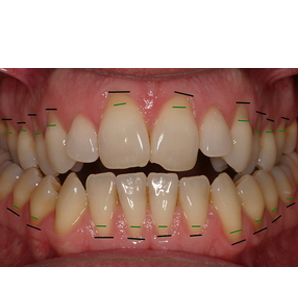
3. Early Type 2 Diabetes Detection from your Dentist |

![]() A new research carried out by the University of Amsterdam in The Netherlands - published in the journal BMJ Open Diabetes Research & Care – suggests that severe gum disease, or periodontitis, might be an early sign of diabetes. The authors also suggest a simple finger stick diabetes screening procedure could be carried out in the dental office to avoid the adverse effects of leaving diabetes untreated.
A new research carried out by the University of Amsterdam in The Netherlands - published in the journal BMJ Open Diabetes Research & Care – suggests that severe gum disease, or periodontitis, might be an early sign of diabetes. The authors also suggest a simple finger stick diabetes screening procedure could be carried out in the dental office to avoid the adverse effects of leaving diabetes untreated.
![]() Researchers assessed a total of 313 participants from a dental clinic at the university. Of these, 126 patients had mild-to-moderate gum disease, 78 patients had severe periodontitis, and 198 individuals did not have signs of gum disease. The diabetes risk factors - such as high blood pressure or high cholesterol - were similar across all three groups, except for participants with periodontitis, who had a higher body mass index (BMI) than the rest. The researchers analyzed HbA1c values in dry blood spots, and evaluated the differences in mean HbA1c values, as well as the prevalence of diabetes and prediabetes between the two groups.
Researchers assessed a total of 313 participants from a dental clinic at the university. Of these, 126 patients had mild-to-moderate gum disease, 78 patients had severe periodontitis, and 198 individuals did not have signs of gum disease. The diabetes risk factors - such as high blood pressure or high cholesterol - were similar across all three groups, except for participants with periodontitis, who had a higher body mass index (BMI) than the rest. The researchers analyzed HbA1c values in dry blood spots, and evaluated the differences in mean HbA1c values, as well as the prevalence of diabetes and prediabetes between the two groups.
![]() The analysis revealed that those with the most severe form of periodontitis also had the highest HbA1c values. The average HbA1c values for the severe gum disease group was 45 mmol/mol, compared with 43 mmol/mol in those with mild-to-moderate gum disease and 39 mmol/mol among those without gum disease.
The analysis revealed that those with the most severe form of periodontitis also had the highest HbA1c values. The average HbA1c values for the severe gum disease group was 45 mmol/mol, compared with 43 mmol/mol in those with mild-to-moderate gum disease and 39 mmol/mol among those without gum disease.
![]() Additionally, the researchers found a high percentage of people with suspected diabetes and prediabetes among participants with mild-to-moderate as well as severe gum disease. Also, the researchers found previously undiagnosed cases of diabetes across the three groups: 8.5 percent of those with no gum disease and a little under 10 percent of those with mild-to-moderate gum disease had not been previously diagnosed with the disease until the study. As much as 18 percent of those with severe gum disease had not been diagnosed with diabetes. The authors’ opinion is that screening patients with severe periodontitis for diabetes as part of dental medical practices might be an effective way of avoiding complications of the disease.
Additionally, the researchers found a high percentage of people with suspected diabetes and prediabetes among participants with mild-to-moderate as well as severe gum disease. Also, the researchers found previously undiagnosed cases of diabetes across the three groups: 8.5 percent of those with no gum disease and a little under 10 percent of those with mild-to-moderate gum disease had not been previously diagnosed with the disease until the study. As much as 18 percent of those with severe gum disease had not been diagnosed with diabetes. The authors’ opinion is that screening patients with severe periodontitis for diabetes as part of dental medical practices might be an effective way of avoiding complications of the disease.
For enquiries info@jothydev.net.
Please visit: jothydev.net | research.jothydev.com | diabscreenkerala.net | jothydev.com/newsletter
